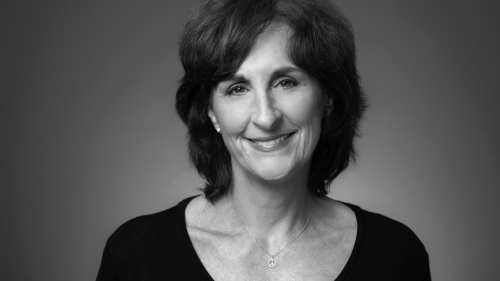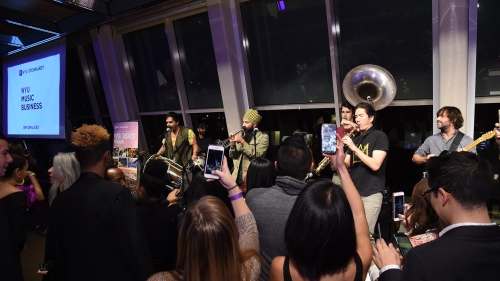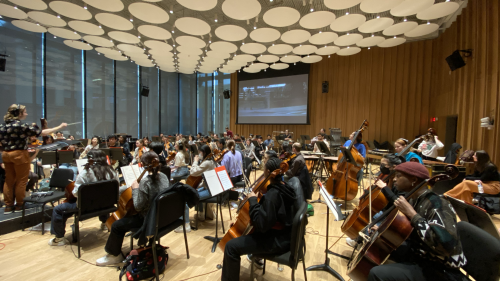
Visiting Assistant Professor Susan Dodes is a seasoned music executive in the entertainment business. She shares insight into her career, NYU's Program in Music Business, and the exciting opportunities available in the music industry.
Talk about your career in the music business.
I'm a 30+ year music business talent executive who built my career in A+R (Artists and Repertoire) in both the record label and music publishing areas of the business. This essentially means having the responsibility of signing talent both for recording and songwriting. It also includes the facilitation of the recording project for artists signed to a record label from all aspects (including creative and financial). I have held executive positions at Warner Chappell Music Publishing, Sony Music, and MCA Universal on the record side.
I've been a professor for almost 15 years. I have a Master's Degree in American Studies from Columbia University, where I spent a lot of time looking at the way we use music as a lens to study culture, politics, history, and more.
I started teaching in the UK at the Brighton Institute of Modern Music, part of the University of Sussex, when I was finishing my master's. I had been giving lectures and master classes as an executive, and was asked by a British colleague if I would be interested in teaching. Once I started, I liked it.
I became a professor and Program Director of the Music Business Program at the University of New Haven in 2013. Five years later, I met NYU’s Director of Music Business Larry Miller, who asked me to come to NYU.
What can students expect to learn in the Music Business Program?
Music Business is two-tiered, with a Bachelor’s Program and a Master's Program. Our overarching goal is to ensure students get an understanding of the contemporary music business, and the factors that contribute to its growth.
We look at the evolution of the business over the last 50 years. It’s currently driven by technology both creatively and on the distribution and consumption side.
Students begin to understand how these technologies evolve, and how they're used to create, distribute, and consume music. They also learn about the legal side of the music business, including laws and processes, which provide infrastructure for how creators and music companies earn money.
In my classes, we look at creative processes and boundaries of the business. One of my courses focuses on the songwriting and music publishing industries. It covers how songwriters protect and monetize creations. We're encouraging creative people to create, while understanding it’s equally important to make a living at the same time.
Please describe the Music Business Internship Program?
My personal philosophy is if you want to be in the music business, you need to be IN it.
You could sit in a classroom for years, learning in a theoretical space. Until you’re doing the job, you won’t have a full understanding of it. Thus, internship opportunities are very important.
We get students involved in the music business while they're studying. Having a variety of internship experiences helps them determine what they like and what they don’t want to pursue.
What are Music Business's Study Away opportunities like?
We run several January term programs which allow students to investigate aspects of the music business in other cities. Graduate students can go to London or Brazil where they interact with creators and business people.
There's an undergrad program in Nashville, which I created. It's a partnership with Universal Music Group, and focuses on A+R and production.
Students record emerging artists with Grammy winning producers and engineers, and learn how to create a commercially viable record from the best in the business. As far as we know, there's no other program like this so NYU is proud to facilitate this experience.
How many guest speakers do you normally host each semester? Can you share who some favorites have been and why?
We've had amazing guests throughout our department. We bring in a diverse group of creators, artists, high level executives, producers, engineers, and more. It’s important for students to hear contributors from all sectors of the music industry.
One of my favorites this year was Caroline Williams, the Executive Vice President at RCA records. She brought her Vice President of Marketing, Shani Fuller Tillman. These are two women of color who have worked their way up to the highest levels within their label.
They discussed what it takes to develop a fan base in the rap, R&B, and hip hop marketplace. These women work with Steve Lacey, Doja Cat, SZA, and more. They shared important insights and encouragement to students, and have hosted several NYU students as interns in the last year.
Was there any guest speaker who made an especially big impact on students?
Executive Vice President of Global A&R for Universal Music Publishing Group and former artist David Gray came to speak during the Fall 2022 semester. He’s also been a dedicated Executive in Residence for our Program, spending time with the Graduate students, often on a one-to-one basis.
David brought Republic Records recording artist Chelsea Cutler with him when he spoke. They discussed the relationship between publishers and songwriters, which is a very unique dynamic. It was incredibly exciting for the students.
How has the music industry changed in just the last five years?
A critical element of the industry’s marketing structure is the ability to build and maintain fan engagement platforms.
Consistently feeding a fan base with information, whether it's about creative projects or your personal life is essential. There's been backlash from artists who feel a constant need to feed social media’s content beast, as it can cut into creativity and ability to live life.
Another thing I've noticed has to do with catalog music, which is any recording that's older than 18 months. Recently, catalog music has been driving close to 70% of streaming revenue.
What does this say about the music artists are putting out now? If somebody would rather listen to a record from two or three years ago more consistently than new music, the industry should consider why.
I am curious to watch how catalog investments continue dominating the music space.
What have you learned from your students?
The best thing about my job is what I learn from my students. When I was in college, nobody talked about mental health, struggles with gender issues, and other challenges. My students' willingness to be upfront about these very personal issues is refreshing and courageous. I applaud the fact that my students find solace in musical artists who reflect similar challenges.
One of the ways students have used music to deal with mental health issues is by creating playlists of specific music and artists for people in therapy. Some have even decided to use their degree in the health and wellness space.
Anything a graduate of the Program has gone on to do that surprised you?
One of our former graduate students is an Indian artist featured as an outstanding new artist on Spotify India.
One day I was walking through Times Square, and she was on a giant billboard. It was fantastic to see her up there, she's a terrific artist and it was an exciting moment.
Anything else you’d like to add?
All of our faculty have clinical expertise in the music industry, which makes our Program competitive and special. We provide opportunities for our students the moment they step foot on campus so they feel they’re “in the music business” from the start of their time here.


